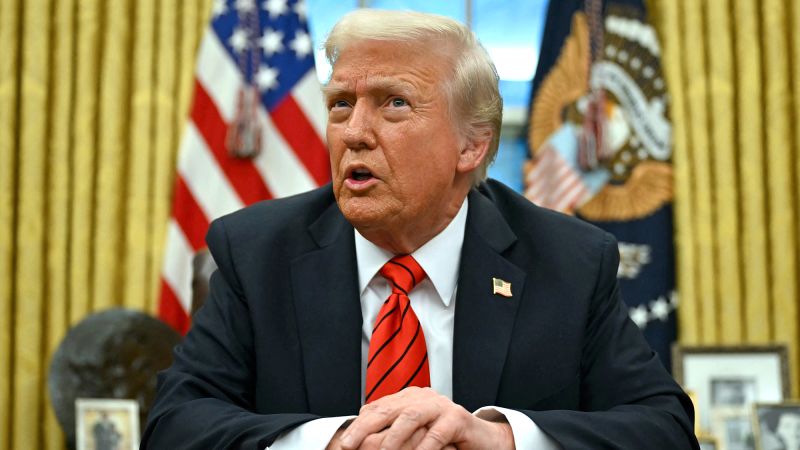CNN
—
Eight inspectors general whom Donald Trump fired from their federal agency watchdog posts are suing for their jobs back, adding to the legal scrutiny over Trump’s first weeks of decisions in the White House and raising questions about his political intentions.
They say that Trump shouldn’t have been able to fire them in late January without first notifying Congress and that the White House ignored regulations around their removal that existed to protect them from political interference and retribution.
The administration’s “actions have inflicted substantial damage on the critical oversight ethos of transparency, truth-telling without fear or favor, and respect for the rule of law,” the lawsuit, filed in Washington, DC’s federal court on Wednesday, states.
The lawsuit is the latest among more than four dozen filed in federal courts to challenge swift, early executive actions by the Trump administration. Many of the lawsuits, like Wednesday’s, allege that Trump’s White House is depriving Congress of some of its power. The IG’s case adds to a pile of challenges from government workers the Trump administration has removed from various posts — especially those in independent or non-political roles.
The dismissals also raise questions over Trump and temporary government adviser Elon Musk’s adversarial approach to existing, long-established federal corruption watchdogs, at a time Trump and Musk are dismantling parts of the government, citing in part a desire to root out corruption.
Trump’s dismissal of 18 IGs happened in the first week of his second term, when the watchdogs each received two-sentence emails titled “White House Notification” from the Office of Presidential Personnel. The reason they were given was “changing priorities,” which is not a sufficient reason under the law, their lawsuit claims.
Soon after, the IG’s government email access was shut off, and they couldn’t return to their office buildings.
“Their purported removals were legal nullities, and so they remain the duly appointed IGs of their respective agencies, unless and until the President lawfully removes them in compliance,” attorneys for the eight IGs wrote.
“Plaintiffs’ integrity has been baselessly maligned publicly, with the abrupt and unlawful nature of their purported removals incorrectly implying that plaintiffs have done something wrong when in fact they have each done nothing but uphold the values of their positions and the IG community,” the suit adds.
The IGs allege Trump has told Congress – as is required by law – nothing. The lawsuit instead points out the president commented to the press some IGs “were not doing their job.”
Trump fired a 19th inspector general, the USAID’s watchdog, this week.
The inspectors general, in positions across many government agencies, work to find and prevent waste, fraud and abuse within federal departments. The IGs say their work is non-partisan and ultimately saves taxpayers billions of dollars, protects vulnerable Americans’ rights and safeguards national security, according to the complaint.
Those whom Trump fired include IGs at crucial departments including Defense, Health and Human Services, State and Veterans Affairs who say their work has saved the agencies millions of dollars.
One of the IGs who is suing, Phyllis Fong, had been in her position at the Department of Agriculture for more than 20 years.
After Fong was told she was fired, she continued to go to work, “recognizing that her termination was not effective because it failed to comply with the IG Act’s requirements,” her attorneys wrote, until her federal badge was deactivated and her computer and phone were taken back by the Department of Agriculture.
Several of those who are suing had worked under Trump during his first term in the presidency, and one, Hannibal “Mike” Ware of the Small Business Administration, had been Trump’s nominee for the post in 2018.
The other IGs who are suing are: Robert Storch of the Defense Department; Michael Missal of Veterans Affairs; Christi Grimm of Health and Human Services; Cardell Richardson of the State Department; Sandra Bruce of the Education Department; and Larry Turner of the Department of Labor.











